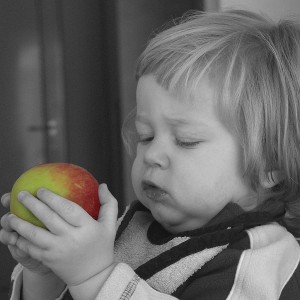A parent’s concern about their young child’s picky eating is one of the most common presenting complaints to primary care clinicians. Generally, if a child is growing and otherwise healthy, the most common response is reassurance and some helpful strategies for how to help kids slowly expand their food repertoire. This strategy usually works well, and most kids do go on to eat a wider variety of foods with the tireless encouragement and cajoling from their parents.
For some, however, it is not so simple. The current list of psychiatric disorders in DSM-5 now includes the term Avoidant/Restrictive Food Intake Disorder (ARFID). The diagnosis replaced the term Feeding Disorder of Infancy and Early Childhood which was rarely used and not well researched. The definition includes the requirement that there is a “persistent failure to meet appropriate nutritional and/or energy needs.” Nevertheless, many medical professionals may be wondering whether ARFID represents a real problem worthy of clinical intervention or is an  example of the DSM over-pathologizing typical and transient child behavior.
example of the DSM over-pathologizing typical and transient child behavior.
To look at this question in more detail, researchers from the Duke Preschool Anxiety Study examined over 900 kids who on average were about 4 years old. They assessed the degree of selective eating through an interview and classified children into groups of “normal,” “moderate,” and “severe” levels of selective eating. Emotional-behavioral problems were was assessed with rating scales and a structured diagnostic interview to see if the children actually met criteria for certain psychiatric disorders.
Overall, at least moderate selective eating was present in 20% of the sample, while 3% were found to be in the severe range. Furthermore, severe selective eating was associated with higher rates of anxiety and depression both with regard to quantitative levels of symptoms and rates of some specific diagnoses (depressive disorder and social anxiety disorder). Investigating other domains, the authors also found that children with selective eating were also much more likely to be hypersensitive to smells, textures, or visual stimuli.
A subset of the sample was followed over time, and the high levels of anxiety were found to continue for many children when they were up to 8 years old.
The authors concluded that especially more severe levels of selective eating were related to other types of emotional-behavioral problems. Their hypothesis was that that the link was not causal (i.e. that selective eating caused anxiety and mood problems) but rather than an enhanced sensory sensitivity may underlie both the food selectivity and some of the associated emotional behavioral problems.
This study has some significant limitations. While the authors do suggest that their data are relevant to the new ARFID diagnosis, they don’t directly assess ARFID in their study. Weight and weight trajectory were also not rigorously measured and indeed, the number of children with weight loss was not found to differ between the three groups of children (although 45% of the severe SE group had low growth). Finally, the number of 4-year-old children meeting DSM criteria for psychiatric illness in this study will strike many people as quite high. For example, 6% and 33% of the severe SE group met criteria for a depressive disorder and social anxiety disorder, respectively. Of note, none of the subjects met criteria for autism.
Another practical issue is that an effective and well researched treatment for ARFID has yet to be determined, although it isn’t hard to find a multitude of recommendations for what to do about moderate and more severe selective eaters alike.
The take-away from this study is not to suddenly start treating every instance of picky eating as a mental health crisis, but perhaps to gather some additional information regarding the severity of the selective eating and the presence of other types of behavioral problems or sensory hypersensitivies that may deserve additional follow-up.
Reference
Zucker N. Psychological and Psychosocial Impairment in Preschoolers With Selective Eating. Pediatrics 2015; August, epub ahead of print.
Tags: arfid, avoidant/restrictive food intake disorder, picky eating, selective eating, toddler


[…] this kind of support. A third example of this reification comes from a child psychiatrist in a blog post about the new DSM 5 diagnosis “Avoidant/Restrictive Food Intake disorder.” He […]